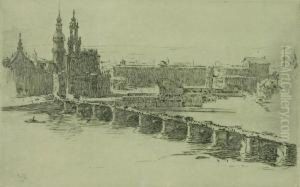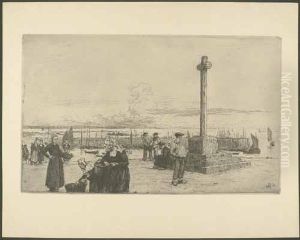Walter Ernst Zeising Paintings
Walter Ernst Zeising was a significant German philosopher, psychologist, and aesthetician who is best remembered for his work on the 'golden ratio,' an irrational number often denoted by the Greek letter phi (Φ) that has fascinated mathematicians, artists, architects, and scientists for centuries. Zeising was born on June 30, 1810, in Ballenstedt, Germany, and he pursued a career that bridged the gap between the humanities and the sciences, which was not uncommon in the 19th century.
Zeising's most notable contribution to the field of aesthetics was his assertion that the golden ratio played a universal role in beauty and proportions, not only in art and architecture but also in nature and human proportions. He detailed these ideas in his work 'Neue Lehre van den Proportionen des menschlichen Körpers' (New Theory of the Proportions of the Human Body), published in 1854, which extrapolated the applications of the golden ratio beyond those that had been previously considered.
Zeising's efforts to apply the golden ratio to aesthetic considerations were part of a larger 19th-century movement among scholars to find a scientific basis for beauty and harmony. His ideas were influential in his time and continue to be a point of reference for those studying the intersection of mathematics and art. However, his work also attracted criticism, with some modern scholars arguing that the prevalence of the golden ratio in art and nature has been overstated.
Zeising's broader work in psychology and philosophy also contributed to the intellectual milieu of his time. He engaged with the ideas of his contemporaries and predecessors, attempting to synthesize a coherent system that could explain both the beauty of art and the order of nature within a single framework. Despite his efforts, Zeising did not achieve the same level of fame as some of his peers, and much of his work has been relegated to a more specialized audience of art historians and mathematicians interested in the history of the golden ratio.
Walter Ernst Zeising passed away on March 27, 1876, in Leipzig, Germany. His legacy is one of curiosity and interdisciplinary study, reflecting the 19th-century belief in the possibility of a unified theory of knowledge that could encompass the arts, the sciences, and the natural world.




